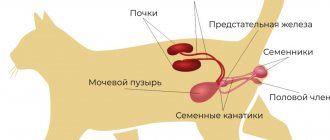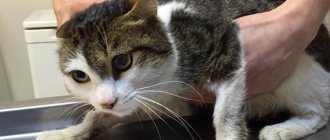8959Pavel
Cats, like dogs, have lived next to us for many centuries. These outwardly cute, proud and self-sufficient animals are endowed with special abilities - they clearly react to changes occurring in the external environment, and are excellent hunters and observers. The pet evaluates changes in a person’s mood, understands that he is ill or is experiencing emotional problems. Can cats sense their owner's pregnancy? Most owners of furry “roommates” answer this question only in the affirmative.
Why do cats react to pregnancy? To obtain an answer, several criteria must be considered :
- changes in a woman’s physical condition during pregnancy;
- instability of mood and changed emotionality, anxiety of the expectant mother;
- actions related to the purchase of children's things and arrangement of the apartment.
© shutterstock
Cats and your hormonal changes
There's nothing more synonymous with pregnancy than hormones.
Essentially, they make pregnancy possible, maintain it for 9 months, and then (probably) induce labor in a series of still-mysterious changes that lead to the birth of your baby. Rising hormone levels during pregnancy are also responsible for most of your symptoms, such as morning sickness, fatigue, pelvic pain and food cravings. You are particularly influenced by the following hormones:
- HCG, also known as human chorionic gonadotropin . This hormone is produced by cells of the placenta. Because your levels are very high in early pregnancy, hCG is used to confirm pregnancy through urine and blood tests.
- Prolactin and relaxin . Prolactin helps produce breast milk, and relaxin affects the muscles of the uterus and pelvic joints. Although both of these factors are important for labor, they begin to increase in early pregnancy.
- Progesterone . This hormone energizes your uterus before pregnancy and helps maintain a healthy pregnancy after fertilization.
- Estrogen . During pregnancy, estrogen works wonders: it regulates other hormones, helps the baby develop, regulates blood flow and causes milk ducts to form.
There is no evidence that pregnancy hormones cause you to smell anything, but we do know that other body substances, such as pheromones and hormones that are released during puberty, can produce subtle (and not-so-subtle) odors, so that this is possible.
But can cats detect these odors? Well, we don't know that either. There's no doubt that cats have super-strong olfactory senses: According to PAWS Chicago, cats have about 200 million olfactory receptors in their noses, compared to our measly 5 million.
This doesn't mean they can detect any hypothetical odors caused by pregnancy hormones. But if these odors do exist, a cat's nose could theoretically detect them.
How long does pregnancy last
The answer to the main question, how long pregnancy lasts, is from 57 to 66 days from the moment of successful mating. It is not enough just to know the duration of an interesting situation. The owner needs to understand how each period goes and what to expect from the pet.
So, pregnancy in felines lasts approximately 2 months. It is difficult to set an exact deadline, since it depends on several things. Firstly, it is not always possible to find out exactly when the female and male had a successful mating. Secondly, the duration of pregnancy is influenced by the number of kittens in the litter. Thirdly, the cat breed plays a big role:
- Siamese - 66-68 days;
- oriental - 66 days;
- British - 63-64 days;
- korat - 62-63 days.
These are average values, but still worth taking into account. Especially when it comes to premature birth and the pet needs the help of a specialist.
About two months pass from conception to the birth of kittens.
Early labor
Felines also experience premature birth - this is the birth of kittens before the 57-60th day. It is necessary to immediately seek the help of a veterinarian, because premature birth threatens the lives of babies (they may not yet be able to suck milk or breathe on their own). It is better to call a veterinarian at home as soon as the female begins to give birth.
Labor can begin earlier even in multiple pregnancies. This often happens when a cat is carrying up to 5-7 kittens. Childbirth not quite on time (literally a few days earlier than expected, for example, 55-56) in this case is considered the norm.
Unfortunately, the death of a fetus in the womb is not uncommon - then the female gives birth to only one kitten (the dead one), and will continue to carry the rest according to their due date. However, partial labor is a reason to take your pet to the vet immediately. He must make sure that the rest of the babies and the expectant mother are not in danger.
Post-term pregnancy
Sometimes, when labor does not begin for a long time, owners are interested in something completely different: how long can you walk in position? Do not worry until 70-73 days - only from this period the pregnancy is considered post-term. It is not at all a fact that you have correctly determined the date of conception. It is also necessary to visit a specialist: x-rays and ultrasound will help you understand how soon the babies will be born. Diagnostics will allow you to determine the weight and size of the fetus as accurately as possible, and then, based on this, draw a conclusion about the cat’s gestational age.
Post-term pregnancy is not uncommon for cats. However, not every owner knows the exact date of conception.
Description by week
Why do you need to know how a cat’s pregnancy progresses week by week? Sometimes even minor changes in her condition indicate serious problems and require a visit to a specialist.
Fertilization occurs a day after sexual intercourse, but for this it is necessary that the eggs enter the fallopian tube (ovulation). In cats, ovulation occurs during the mating process. Having multiple sexual intercourse over a short period of time will increase the chance of pregnancy. For fertile caudates, one mating is enough.
At 1–3 weeks, the fetus is attached to the walls of the uterus, then the formation of the most important systems of the body begins. In the first weeks, the placenta forms. The size of the fruit is no more than 1 cm.
At 4–6 weeks you can already find out the exact number of embryos using ultrasound. The size of the offspring reaches 4–6 cm. At this time, they already have barely noticeable fur. As mentioned earlier, it is not advisable to palpate kittens. In addition, the uterus fills with fluid, and only a specialist can cope with this task. By the age of 4–5 weeks, tailed cats recover slightly, especially if they are carrying only two or three kittens.
Babies continue to grow actively - by 7–9 weeks their body length reaches 8 cm, and their weight reaches 100 g. Gradually they become more active, so movements can often be seen by wave-like fluctuations in the cat’s abdomen. At the end of pregnancy, the mammary glands of the expectant mother swell even more, and minor discharge is possible from the genital tract.
Cats and your behavior
During pregnancy, not only your hormones change: you are moody, tired, constantly nauseous and very irritable. These emotional changes will affect your behavior, and your cat will likely realize that you are acting differently. (They are creatures of habit, after all, just like us.)
Rapidly rising hCG levels can cause nausea, and if you vomit in the bathroom every morning instead of feeding your cat at the usual time, she will notice.
Progesterone can make you overly tired during pregnancy, and your cat may wonder why you nap on the couch so often instead of running errands.
You're busy planning for the baby—like designing a nursery and researching lists of baby names—which means you have less time and energy to shine a laser pointer around the house for your cat to chase.
Blood volume and circulation increase during pregnancy, which may raise your body temperature slightly. Your cat may notice that you're hotter than usual (and she might even like it, because cats seek out warm, cozy places).
If you normally groom your cat, note that you should no longer clean her litter box. She may be wondering why someone else is doing this task now.
What happens in a woman's body
A cat can feel its owner's pregnancy early, in the first months, weeks, even days after conception. Such insight is understandable, because special processes occur in a woman’s body, which are expressed by noticeable physiological changes :
- hormonal changes occur with signs of toxicosis - nausea, vomiting, reactions from the digestive system and intestines;
- body temperature rises slightly;
- the frequency of urination changes, the urine acquires a different smell;
- vaginal discharge becomes profuse.
Pets can't help but notice these bright signs. It is at such times that they become restless, try to accompany their owner, lie down next to her, and like to climb onto her stomach. They purr intensely and perform a “massage” with their paws.
The unborn baby is actively developing, while the woman’s belly is growing, inside of which a heartbeat can be heard and the activity of the fetus is felt. At the same time, the pregnant woman’s gait and movements become cautious and measured, her breathing quickens, and shortness of breath appears. Cats feel these metamorphoses. Animals have a developed natural curiosity; the pet watches what is happening with interest and accompanies the woman. Lie down next to him, listen, purr loudly and start rubbing his stomach - the favorite actions of most furry apartment dwellers.
Some cats negatively perceive the new state of their owner and regularly confirm their disagreement with her new situation with their actions - they show aggression, attack and hiss. Experts are inclined to explain this behavior by the animal’s fear of being expelled from its home, not being fed, as something incomprehensible is happening in the life of its owner.
© shutterstock
Cats and the fetal heartbeat
Thanks to its keen hearing, your cat knows that the garbage truck is on its way to do its thing before you do. But we don't know if they can actually hear your baby's heartbeat before it can be detected by other means, such as a Doppler or stethoscope.
Cats have an extra fold on their ears that can play a role in amplifying high-frequency sounds, allowing them to hear things we can't hear.
At some point late in your pregnancy, your partner will be able to hear your baby's heartbeat simply by placing his ear to your belly. So it's reasonable to assume that around this time, Fluffy can also hear the baby's heartbeat from his seat nearby on the sofa.
However, how sooner a cat can hear it and how well is still a giant scientific question.
Caring for a pregnant cat:
To feed a pregnant cat, you need to use special food for pregnant women; proper feeding will help future kittens develop well. 3-4 days before birth, it is advisable to do an ultrasound to determine the number and size of the fetuses - this will help predict the course of pregnancy (sometimes the kittens are too large - in this case the issue of surgery is decided).
Top Articles: Eland Facts
Throughout pregnancy, you need to protect the cat from overheating and hypothermia, handle it carefully, and do not allow strong hugs from household members, especially children. If your cat is a fan of climbing to the top of cabinets, then try to limit her jumping to low surfaces to avoid falling.
For the birth and subsequent feeding of kittens, it is necessary to prepare a room - agree with the household that in the room where the cat and kittens will be, there is no need to make noise or perform manipulations that frighten the cat (for example, do not vacuum). To make a “nest” for a cat, you can take an empty cardboard box or use an old bedside table, or make a “plywood maternity hospital” yourself. The large hole for the cat to pass through should be sized to accommodate the fact that a pregnant cat will climb into it; this hole should be located at some distance from the floor so that the kittens, starting to crawl, do not leave the box too early.
How your cat might react to your pregnancy
When cats face major life changes, they react differently. The only thing you can expect is that your cat will react in some way to everything that happens, but other than that, it's hard to say how.
- Some cats are protective of an owner who isn't feeling well or is behaving differently, so your cat may work harder to get between you and your partner.
- Some cats develop into stage 5 clinging when their owners behave strangely. Your lonely cat may suddenly act like a little shadow, following you from room to room and placing itself in your personal space.
- Some cats become real assholes. They may urinate in random places, scratch furniture, hide from you, refuse to eat - all this is typical rebellious behavior of cats that are very excited about changes in their lives.
Preparing a cat for the birth of a baby
We talk all the time about cats "knowing" you're pregnant, but that implies cognitive awareness that they simply don't possess. (Yes, your cat is the smartest cat we know, but she still doesn't understand what's going on.)
Your cat just knows that things are different—and, unfortunately for your cat, things will be even more different when your baby is born. To prepare your cat for the upcoming changes, follow these steps:
- Introduce baby items and move furniture around the house slowly, especially if you plan to dislodge the cat from her favorite places. You need to get her used to cribs and booster seats without filling the whole house at once.
- Start playing recordings of baby noises, especially babies crying. These sounds can be stressful for cats, and you don't want her to associate them directly with the arrival of the baby.
- Start blocking off the room your baby will sleep in and place barriers or tape (cats hate sticky surfaces!) around the crib to prevent your cat from thinking the crib is an appropriate place to sleep.
- Make a plan to introduce your cat to your baby when he is born. It's wise to let your cat get used to your baby's scent by introducing her to a blanket or piece of clothing from the hospital. Next, make sure that all formal introductions are strictly supervised and your cat is never left alone with your baby.
Keep in mind that stress can have negative effects—both behaviorally and physiologically—on all cats, especially those with pre-existing health problems such as chronic pain.
Watch for new vomiting, diarrhea, or eating behavior (such as refusing to eat), as these may be signs that your cat needs to be seen by a veterinarian.
Cat before birth
So, as we have already said, the first signs of impending birth are observed 7-10 days in advance.
From this period, the owner should pay special attention to his cat. If she goes for a walk outside the house, take her from the street and try not to leave her alone for a long time
You can tell that a cat is ready to give birth by the following signs:
- often lie down in a prepared box on your back;
- in the stomach you can visually notice the active movement of kittens;
- the cat begins to actively wash itself, lick the genitals, even to the point of licking off all the fur under the tail;
- a day before giving birth, she is constantly in the birth box, from where she comes out to drink water or milk;
- does not eat anything on the last day before giving birth;
- The animal's genitals become noticeably swollen, and redness of the nipples and skin under the tail is also observed.
Have you noticed these signs in your cat? Then you no longer have to wonder how long it will take for her to give birth. Here everything is already extremely clear - childbirth can take place at any minute within the next 24 hours! Be prepared for this process and purchase everything you need in advance in case complications arise during labor.
How can you tell if your cat has started giving birth? Before giving birth, a mucus plug comes out of the cat’s genitals, then the birth process begins, during which the cat can meow loudly and pitifully. At this moment, the owner should be nearby and calm his pet with gentle stroking and kind words of support.
To make it easier for you to navigate this difficult matter, consult in advance with a veterinarian who will answer all your questions in detail. Childbirth can happen differently for each animal.
For example, ordinary cats that do not have pedigree roots often give birth on their own. The owner may not even notice this process and see already born kittens affectionately eating their mother's milk.
It is impossible to predict how the birth will go. This depends on the individuality of the animal’s body and whether the cat has given birth before. Young individuals bearing offspring for the first time take longer than usual to give birth and often scream loudly. Due to lack of experience, such cats often try to run out of the box, which is not at all recommended.
It is also not advisable to allow rollovers and squats. In such positions, a cat can seriously harm her kittens. To eliminate such risks, the owner needs to control the birth process and prevent such positions of the animal’s body. It is better to carefully turn her on her side and gently stroke her stomach and back. This will calm the frightened mother cat a little.
Even an inexperienced owner will notice that the cat has begun to give birth. The first kitten will emerge from the genitals of the expectant mother. At this moment, the woman in labor will strain and push very hard, thereby trying to quickly push the baby to the light.
The first kitten may be in the amniotic sac, which occurs if it does not burst during birth. The cat will be able to free the baby from the bubble by carefully gnawing the shell.
If this does not happen, take the initiative and free the newborn from the bladder using sterile scissors. When cutting the shell, be extremely careful and attentive so as not to harm the kitten.
How can you tell if your cat is no longer giving birth? The frequency of birth of each kitten is 15-40 minutes. This means that you won’t have to expect a quick birth. After the kitten is born, the placenta emerges from the genitals, which she must eat. This will allow the woman in labor to quickly realize motherhood and speed up the lactation process.
As a rule, the owner does not have to persuade the cat; it eats the placenta by force of natural instinct.
After the placenta is delivered, you can understand that she gave birth to all the kittens and has already finished giving birth. It is very good if the birth was successful for both the mother cat and her offspring. But sometimes complications occur, which we will now talk about!
Summarize
Does your cat know you're pregnant? Yes and no. She doesn't know what pregnancy is, but she probably knows that changes are happening in you.
We can't say for sure whether cats are reacting to any new smells, hearing a new but faint heartbeat, or simply picking up on all the changes in daily life.
But cats are very sensitive and perceptive animals. It's reasonable to assume that many of their super senses are triggered when a new person is growing up nearby.
Sources
- A cat's five senses. (2019). vetmed.tamu.edu/news/pet-talk/a-cats-five-senses/
- Amat M, et al. (2016). Stress in owned cats: Behavioral changes and welfare implications. pubmed.ncbi.nlm.nih.gov/26101238/
- Lee NM, et al. (2013). Nausea and vomiting of pregnancy. ncbi.nlm.nih.gov/pmc/articles/PMC3676933/
- Sanghavi M, et al. (2014). Cardiovascular physiology of pregnancy. ahajournals.org/doi/full/10.1161/circulationaha.114.009029
- Stella J, et al. (2013). Effects of stressors on the behavior and physiology of domestic cats. ncbi.nlm.nih.gov/pmc/articles/PMC4157662/
- Verhaeghe J, et al. (2013). Pheromones and their effect on women's mood and sexuality. ncbi.nlm.nih.gov/pmc/articles/PMC3987372/











